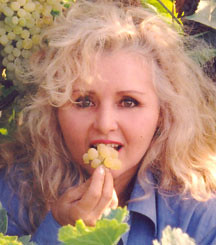
Here's Part Two of our interview with Hatice Yavuz, co-owner of Cousin's I.V. raw restaurant in Chicago. Yesterday we talked a lot about Cousin's restaurant and the stories behind that (as well as some interesting notes about European and Turkish culture and attitude toward raw foods). Today we'll get into some of the effects experienced by many after going raw -- things like raw food detox and the strengthened connection between mind and body. Interesting stuff!
?
Jim here... A few months ago, I'd posted an article here on the topic of Cognitive Dissonance. This theme seems to crop up from time to time in questions people ask about the raw foods lifestyle. For example, one new raw fooder recently posted a question in a raw foods forum asking whether other raw foodies had reached a place in their lives at which things changed so much that they felt as though they were living a contradiction. Because this struck home for me, I'd like to reiterate my response, somewhat edited, below.

Hey Everyone- Just a quick note, in case you're reading our blog and thinking, "Wow, Wendi and Jim usually update daily! What's up ?!!" We'll get back to it pronto, I promse -- maybe even later today! Turns out it's just a TON of work orchestrating a tour like this, especially across a three-hour time zone. But, now that we're getting used to it, I think we can look for some more timely updates. The latest is from Corvallis, Oregon. But, we're also going to talk about Portland a lot more soon! So, stay tuned! -Jim
Original Comments
Below, we have included the original comments from this blog post. Additional comments may be made via Facebook, below.
On March 4, 2010, wrote:
I hear ya. I do keep checking in though, and I'm looking forward to when you get your groove.
I really feel for you, Jim. Your girls gone, having to keep track of their movement, run a household on your own and still work that stupid job. Poor baby. Just know that I am thinking of you, and sending you love from New Mexico.
And Wendi, AAAaaaaaaaaaaaaaah! I can hardly wait 'til you get here!
Terri
On March 5, 2010, wrote:
We are getting all ready here for W and K! so far we have the following guests for Cru:
Bueller of Bueller's Kitchen, Lori of Inspire2Act, Ingrid of Raw Epicurean, Dianna Harrelson, LA Raw meetup organizer and raw teacher, Puki (friend of Courtney Pool), and a few other folks .. and ME!
xoxoxo deb
Well, we've finally done it -- made the move westward to our new hometown, Portland, Oregon! It's been nothing but the kind of high adventure befitting such a move, not the least of which was a wheel literally flying off of our car while driving (don't worry, no one was hurt) just days before we were scheduled to leave. And, of course, everything during the past few weeks wound up costing about 10x what we'd planned. ?But, we're here! ?And, we're beginning to get settled.
As always, we've got some great things on deck for this blog in the coming near term, including many interesting articles and some fun video experiments we did involving live blood and electrical grounding. We also have some new exciting web site features to roll out, one completely new raw food site to unleash upon the raw foods community, and a whole new Pure Jeevan web site design to launch. For now, though, we'll probably remain off-line for a bit longer, as we organize and unpack things.
Our Pittsburgh home remains for sale. Naturally, we'd hoped to have sold it before making this move. But, we realized that we didn't necessarily have to wait for it to sell in order to move to Portland. So, we took the great leap of faith and moved here without that step completed. (It'll certainly be a happy day when that lovely home finds its new owners and caretakers!).
Read more: Greetings from PDX, Pure Jeevan's New HQ!! (Post #756)

We just returned from the East End Food Co-op, where we answered raw food questions for two hours. We were still answering questions on our way out the door, and would have stayed longer but the place was closing. ;-) So, if anyone from this evening stops by our site and you still have questions, just comment here (or send me an email) and I'll be happy to answer them.
I'm more of a one-on-one kind of person, so I was a bit nervous about sitting in front of everyone to answer questions. Jim and KDcat were there to help me, of course, otherwise I probably wouldn't have been there at all. Once people started arriving, I was comfortable. The first people who entered the room were super sweet and I could tell they were genuinely nice people. Then little by little the room filled up, and I was surprisingly comfortable.Maybe in addition to all of the other positive changes in my life, my self confidence is getting better, too!

In all of our discussion of immune-building lately, we remembered today that we left out one enormously important item that should be present in anyone's "healing toolbox." That item is, of course, laughter. What better time than a "Fun-Filled Friday" to celebrate the healing power of humor!
 Years ago, we'd heard a remarkable story about a man who had cured himself of a terrible disease using laughter as his "medicine." According to the story we heard, the man checked himself into a hotel and just watched Marx Brothers comedies for hours on end, and was eventually cured.
Years ago, we'd heard a remarkable story about a man who had cured himself of a terrible disease using laughter as his "medicine." According to the story we heard, the man checked himself into a hotel and just watched Marx Brothers comedies for hours on end, and was eventually cured.

End of day 4:
Yesterday I decided to go ahead and consume what my body was telling me it wanted: cooked, fermented rice and lentil pancakes. Well, the restaurant nearby that makes the Uthappam doesn't serve them until 5pm and it was lunch time. So, I ordered the simpler, steamed, fermented rice and lentil patties called Idli.

Today, for Thankful Thursday, I want to focus on a raw food related subject: Raw Recipe Books! Without the many mouthwatering, visually appetizing recipes that have been created and published, I don't know if I'd still be living a raw food lifestyle at this time.
About two years ago, when I made the decision to transition into a raw food diet, there were some fantastic raw food recipe books available. A few years before that, when I tried raw for the first time with a dear friend of mine, there were books available but none of them were truly gourmet meals. It's amazing how much things change in just a few years! The newer books are filled with colorful pictures of the most visually stimulating foods, which never looked like simple chopped up veggies arranged nicely on a plate. We have a page with many raw recipe books listed, if you'd like to see some of the ones that are available.

Wow, with literally years of raw food coverage under our belts here at Pure Jeevan, we don't think we've ever devoted an entire post to fermented foods. Well it's high time we do, don't you think ? Check out the video and then we'll discuss it further...

If you are in the Pittsburgh area this weekend, you are in for a real treat! Rhio will be visiting with us and she'll also be meeting with others during her two-part presentation for the Pittsburgh Raw Food Meetup on Saturday.You don't have to be a member of the meetup to enjoy this presentation. Below is information about the event you won't want to miss!
Two-Part Presentation by Rhio includes Dinner

Today I answer the second part of a letter Jim received from a Pure Jeevan member who was seeking advice about her daughter who has decided to become a vegetarian. Rather than quote parts of her letter, I'll summarize the questions (because they are general questions that we hear a lot and our answers are given for everyone, not just the individual who sent the most recent letter).
1) I don't have a lot of money for all the produce and kitchen appliances, so how can I eat a healthy diet2) I live with others who don't eat the same diet, so how can I possibly make this work
Read more: Financial Stress and Group Living Concerns (Part 2 of 2)
